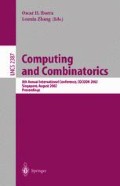Abstract
Algorithms for radio networks are studied in two scenarios: (a) the number of active stations is known (or approximately known) (b) the number of active stations is unknown. In the second (more realistic) case it is much harder to design efficient algorithms. For this reason, we design an efficient randomized algorithm for a single-hop radio network that approximately counts the number of its active stations. With probability higher than 1 - 1/n, this approximation is within a constant factor, the algorithm runs in poly-logarithmic time and its energy cost is o(loglogn). This improves the previous O(logn) bound for energy. In particular, our algorithm can be applied to improve energy cost of known leader election and initialization protocols (without loss of time efficiency).
partially supported by KBN, grant 8T11C 04419 and DFG, grant GO 493/1-1, and AXIT Polska
Access this chapter
Tax calculation will be finalised at checkout
Purchases are for personal use only
Preview
Unable to display preview. Download preview PDF.
References
Bar-Yehuda, R., Goldreich, O., Itai, A.: On the Time-Complexity of Broadcast in Multi-hop Radio Networks: An Exponential Gap Between Determinism and Randomization. Journal of Computer Systems Sciences 45(1) (1992), 104–126
Bordim, J.L., Cui, J., Hayashi, T., Nakano, K., Olariu, S.: Energy-Efficient Initialization Protocols for Ad-hoc Radio Networks. ISAAC’99, LNCS 741, Springer-Verlag, 1999, 215–224
Chlebus, B.S.: Randomized Communication in Radio Networks. A chapter in „Handbook on Randomized Computing” P. M. Pardalos, S. Rajasekaran, J. H. Reif, J. D. P. Rolim, (Eds.), Kluwer Academic Publishers, to appear
Chlamtac, I., Kutten, S.: On Broadcasting in Radio Networks-Problem Analysis and Protocol Design. IEEE Trans. on Commun. 33 (1985), 1240–1246
Dessmark, A., Pelc, A.: Deterministic Radio Broadcasting at Low Cost. STACS’2001, LNCS 2010, Springer-Verlag, 158–169
Fifer, W.C., Bruno, F.J.: Low Cost Packet Radio. Proc. of the IEEE 75 (1987), 33–42
Gçsieniec, L., Pelc, A., Peleg, D.: The Wakeup Problem in Synchronous Broadcast Systems. SIAM Journal on Discrete Math. 14(2) (2001), 207–222
Gçsieniec, L., Lingas, A.: On Adaptive Deterministic Gossiping in Ad Hoc Radio Networks. ACM-SIAM SODA’ 2002
Gitman, I., Van Slyke, R.M., Frank, H.: Routing in Packet-Switching Broadcast Radio Networks. IEEE Trans. on Commun. COM-24 (1976), 926–930
Hayashi, T., Nakano, K., Olariu, S.: Randomized Initialization Protocols for Packet Radio Networks. IPPS’1999, IEEE 1999, 544–548
Jurdziński, T., Kutyłowski, M., Zatopiański, J.: Weak Communication in Radio Networks. Euro-Par’2002, LNCS, Springer-Verlag (accepted paper)
Jurdziński, T., Kutyłowski, M., Zatopiański, J.: Efficient Algorithms for Leader Election in Radio Networks. ACM PODC’2002, (accepted paper)
Jurdziński, T., Kutyłowski, M., Zatopiański, J.: Energy-Efficient Size Approximation for Radio Networks with no Collision Detection. Technical Report CSR-02-02, Technische Universität Chemnitz, Fakultät für Informatik, http://www.tu-chemnitz.de/informatik/
Motwani, R., Raghavan, P.: Randomized Algorithms. Cambridge University Press, 1995
Nakano, K., Olariu, S.: Randomized Leader Election Protocols in Radio Networks with No Collision Detection. ISAAC’2000, LNCS 1969, Springer-Verlag, 362–373
Nakano, K., Olariu, S.: Energy Efficient Initialization Protocols for Radio Networks with no Collision Detection. ICPP’2000, IEEE 2000, 263–270
Nakano, K., Olariu, S.: Energy-Efficient Randomized Routing in Radio Networks. Proc. of 4th Workshop on Discrete Algorithms and Methods for Mobile Computing and Communications (DIALM), 35–44
Salkintzis, A.K., Chamzas, C.: An In-band Power-saving Protocol for Mobile Data Networks. IEEE Trans. on Communication, COM-46 (1998), 1194-1205
Willard, D.E.: Log-logarithmic Selection Resolution Protocols in Multiple Access Channel. SIAM Journal on Computing 15 (1986), 468–477
Author information
Authors and Affiliations
Editor information
Editors and Affiliations
Rights and permissions
Copyright information
© 2002 Springer-Verlag Berlin Heidelberg
About this paper
Cite this paper
Jurdziński, T., Kutyłowski, M., Zatopiański, J. (2002). Energy-Efficient Size Approximation of Radio Networks with No Collision Detection. In: Ibarra, O.H., Zhang, L. (eds) Computing and Combinatorics. COCOON 2002. Lecture Notes in Computer Science, vol 2387. Springer, Berlin, Heidelberg. https://doi.org/10.1007/3-540-45655-4_31
Download citation
DOI: https://doi.org/10.1007/3-540-45655-4_31
Published:
Publisher Name: Springer, Berlin, Heidelberg
Print ISBN: 978-3-540-43996-7
Online ISBN: 978-3-540-45655-1
eBook Packages: Springer Book Archive

